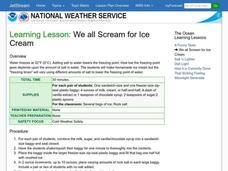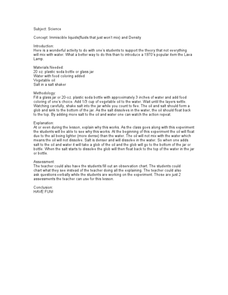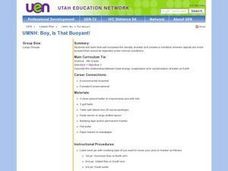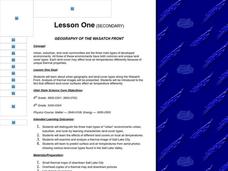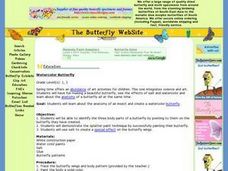Curated OER
LD50 of NaCl to Gammarus spp.
Students learn the meaning of LD50 through lecture and discussion. Through experiment, students graph and calculate the LD50 of salt on fresh water amphipods. Students compare results of the experiment with pesticides and pollutants.
Curated OER
Nature's Polyhedrons
Students are introduced to polyhedrons through using straw models to explore geometric solids and constructing Christmas tree ornaments using Epsom salt crystals. Students will view interactive videos and investigate and retrieve...
Curated OER
Wetland Adaptation
Fourth graders study the impact of the wetland environment on the migration of birds. They make a list of the important reasons on a large piece of paper to be posted in the classroom and point out the biggest wetland in the state (The...
Curated OER
What Do You Like on Your Popcorn?-- Class Bar Graph
In this math worksheet, students participate in a class bar graph activity. Students survey classmates as to their popcorn preferences: nothing, butter or salt. Results are plotted on the graph.
Curated OER
Naming Formulas
In this naming formulas activity, students name 50 given chemical formulas of ionic compounds and covalent compounds including acids, bases, salts and gases.
Curated OER
Separating Solids Experiment
In this separating solids experiment instructional activity, students follow the procedures to find what physical properties could be used to separate a mixture of pepper, salt, sand and iron filings.
Curated OER
Around and Around (The Water Cycle)
Students view a video of the water cycle, and make a water cycle baggie. In this water cycle lesson plan, students watch a video, discuss vocabulary, and make a water cycle baggie out of water, salt, ice, and a hot plate.
Curated OER
Swords, Arrows, and Eggs
Students enjoy hands-on learning experiences. In this current events instructional activity, students may visit the Lulworth Castle, Roald Dahl Museum, Glasgow Science Centre, Salts Mill, or the Sherwood Forest online or in-person to...
Curated OER
Why is the Sea Salty?
Students conduct a hands-on activity to investigate salt concentrations in water and how salt remain after water evaporates. They can also do a Saltwater Painting to once again observe the evaporation. process.
Curated OER
We All Scream for Ice Cream
Pupils make ice cream while experimenting with the freezing point of water. They experiment with different amounts of salt.
Curated OER
A Penny for Your Thoughts
Students collect pennies to donate to Kiwanis International for their international effort to buy salt for children's bone development. They calculate the amount of money donated, calculate how many children will receive salt, and write...
Curated OER
Understanding Salinity
Students discuss why the ocean is salty. They discuss what salinity is. Students are told that is they want to know how much salt is in a body or water, they would use a special scientific tool. They complete an Estuarine Layers science...
Curated OER
Immiscible Liquids and Density
Students will make a lava lamp. In this density instructional activity, students will combine water and oil and make observations, then add salt to the oil and observe the oil sink, then float again when the salt dissolves in the water.
Curated OER
Boy, Is That Buoyant!
Fourth graders see that salt increases the density of water and creates a condition wherein objects are more buoyant than would be expected under normal conditions. They describe the relationship between heat energy, evaporation and...
Curated OER
Is It Safe To Go In?
Students examine acceptable levels of toxins in swimming areas. Working in groups of four, students dilute a salt or sugar solution to 1 part per 1,000,000 (ppm) solution. Students taste test their diluted liquids and record at which...
Curated OER
Layering of Water
Students examine what happens when different types of water meet. In groups, they participate in an activity in which they combine different percentages of salt, fresh and brackish water and record their observations. They let the...
Curated OER
Geography of the Wasatch Front
Students identify the three main types of urban environments by learning characteristic land-cover types. They examine and analyze a thermal image of Salt Lake City. Then they predict surface and air temperatures from aerial photos.
Curated OER
Influence of the World's Ocean Currents on the Carbon C
Students, in groups, observe how the salt content and temperature of water affects the ocean currents. They also read articles and dicuss.
Curated OER
Sink or Float Experiment
Students participate in an experiment to determine which objects float or sink. They use different amounts of salt for the objects and discover as the salt content increases, objects will float. They record their predictions and what...
Curated OER
Colored H2 Balloon Explosions
Learners perform an experiment in which they put different types of salts in a balloon, fill it with hydrogen gas, and ignite it. The electrons in the salt molecules are excited by the heat and release energy in the form of light. ...
Curated OER
PIZZA PARTS
Students will measure the ingredients to make pizza dough and determine basic fractions to cut pizza.Discuss where the different ingredients come from as you follow the instructions below to put the pizza together (flour from wheat,...
Curated OER
Watercolor Butterfly
Students identify and analyze the anatomy of an insect and create a watercolor butterfly. They identify the three body parts of a butterfly by pointing to them on the butterfly they have created and demonstrate the splatter paint...
Curated OER
UMNH: Cultural Clutter - Tales In The Trash
Fourth graders list three or more types of evidence of prehistoric cultures that encouraged archaeologists to investigate the marshes around the Great Salt Lake. They also explain why it is important not to disturb archaeological remains.
Curated OER
Glass Jar Sand Painting
Young scholars make their own colored sand out of salt or sand and tempera paint. They create sand art in recycled babyfood jars, by arranging layers of the different colored sand. They also decorate the jars.
Other popular searches
- Salt Dough Map
- Salt Water
- Salt Marshes
- Salty Oceans
- Gold and Salt Trade
- Great Salt Lake
- Epsom Salt
- Salt Water Chemistry
- Fresh Water Salt Water
- Mahatma Gandhi Salt March
- Growing Salt Crystals
- Freshwater and Saltwater











